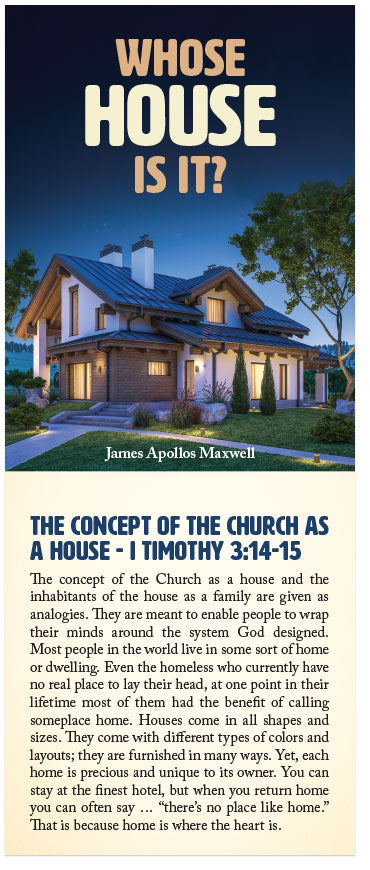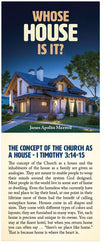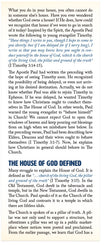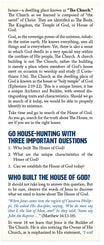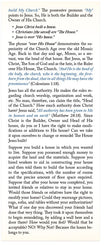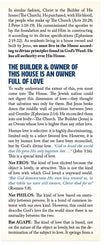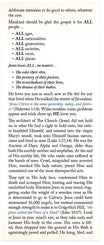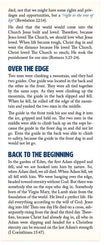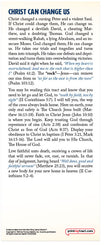Whose House Is It?
Special-Order Folded Flyer Tract
 NOTE: This item is custom-printed to order (click for more details).
NOTE: This item is custom-printed to order (click for more details).
This tract is from our print-on-demand library, and is not kept in stock. Select the options below, and we will custom-print a batch just for you. Because this item is custom-printed, you can add your custom imprint to the back page at no extra cost.
- Estimated shipping date: Friday, January 2 (Click for more details)
- SKU:
- Discounts: Discount coupons do not apply to this item
- Format: Folded Flyer Tract
- Size: 3.5 inches x 8.5 inches
- Pages: 8
- Imprinting: Available with 5 lines of custom text
- Version: NKJV
- Returns: Because this item is custom-printed to order, it cannot be returned.
Show all item details
The full text of this flyer tract is shown below in the NKJV version. (Do you want to print this tract in a different version than the one listed? Contact us and let us know what you're looking for—we may be able to create the alternate version for you at no charge.)
The Concept Of The Church As A House - I Timothy 3:14-15
The concept of the Church as a house and the inhabitants of the house as a family are given as analogies. They are meant to enable people to wrap their minds around the system God designed. Most people in the world live in some sort of home or dwelling. Even the homeless who currently have no real place to lay their head, at one point in their lifetime most of them had the benefit of calling someplace home. Houses come in all shapes and sizes. They come with different types of colors and layouts; they are furnished in many ways. Yet, each home is precious and unique to its owner. You can stay at the finest hotel, but when you return home you can often say … “there’s no place like home.” That is because home is where the heart is.
What you do in your house, you often cannot do in someone else’s house. Have you ever wondered whether God owns a house? If He does, how could we recognize that house if we were to go in search of it today? Inspired by the Spirit, the Apostle Paul wrote the following to young evangelist Timothy. “These things I write to you, though I hope to come to you shortly; but if I am delayed (or if I tarry long), I write so that you may know how you ought to conduct yourself in the house of God, which is the church of the living God, the pillar and ground of the truth” (I Timothy 3:14-15).
The Apostle Paul had written the preceding with the hope of seeing Timothy soon. He recognized the possibility of being delayed, or even not arriving at his desired destination. Actually, we do not know whether Paul was able to rejoin Timothy in Ephesus. If he was delayed, he wanted Timothy to know how Christians ought to conduct themselves in The House of God. In other words, Paul warned the young evangelist to “behave himself” in Church! We cannot expect God to open the windows of heaven and keep pouring out blessings from on high when we misbehave here below. In the preceding verses, Paul had been describing how Elders, Deacons and their wives ought to behave themselves (I Timothy 3:1-7). Now, he explains how Christians in general should behave in The Church.
The House Of God Defined
Many struggle to explain the House of God. It is defined as the “… church of the living God, the pillar and ground of the truth” (I Timothy 3:15). In the Old Testament, God dwelt in the tabernacle and temple, but in the New Testament, God dwells in The Church. Paul speaks of it as the Church of the living God and contrasts it to a temple in which there are lifeless idols.
The Church is spoken of as a pillar of truth. A pillar was not only used to support a structure, but oftentimes a pillar was set up in a public marketplace where notices were posted and proclaimed. From the earlier passage, we learn that God has a house—a dwelling place known as “The Church.” The Church as we learned is composed of “the saved” of Christ. They are identified as The Body, The Kingdom, the Temple of God, or House of God.
God, as the sovereign power of the universe, inhabits the entire earth. He knows everything, sees all things and is everywhere. Yet, there is also a sense in which God dwells in a very special way within the confines of His people, The Church. A church building is not The Church; rather the building is merely a place where members of God’s house meet on occasion to worship and study (I Corinthians 3:16). The Church as the dwelling place of God is known as the house or “holy temple” of God (Ephesians 2:19-22). This is a unique house; it has a unique Architect and Builder, with several distinguishing traits and characteristics. Should we go in search of it today, we would be able to properly identify its existence.
Take time and go in search of the House of God. As you go, search for the truth about The House, to see if you are in the right house.
Go House-Hunting With Three Important Questions
1. Who built The House of God?
2. What are the unique characteristics of the House of God?
3. Can we establish the House of God today?
Who Built The House of God?
It should not take long to answer this question. But to be sure, observe the words of Jesus to discover what we need to know about The House of God.
“When Jesus came into the region of Caesarea Philippi, He asked His disciples, saying, ‘Who do men say that I, the Son of Man, am?’ So they said, ‘Some say John the Baptist …’” (Matthew 16:13-18).
In verse 18 we learn that Jesus is the Builder of The Church. He is also noticing the Owner of His Church, as is emphasized in His statement, “I will build My Church.” The possessive pronoun “My” points to Jesus. So, He is both the Builder and the Owner of His Church.
• Jesus Christ built a house.
• Christians (the saved) are “The House.”
• Jesus is over “His house.”
The phrase “over His House” demonstrates the superiority of the Church Age over the old Mosaic Age. Back in that day and age, Moses, as a servant, was the head of that house. But Jesus, as The Christ, The Son of God and as the heir, is the Ruler over His House, The Church. “And He is the head of the body, the church, who is the beginning, the firstborn from the dead, that in all things He may have the preeminence” (Colossians 1:18).
Jesus has all the authority. He makes the rules regarding church worship, organization and work, etc. No man, therefore, can claim the title, “Head of the Church.” How much authority does Christ have? Jesus said, “All authority has been given to Me in heaven and on earth” (Matthew 28:18). Since Christ is the Builder, Owner and Head of His house, do you or I have the right to make modifications or additions to His house? Can we take it upon ourselves to change or remodel The House Jesus built?
Suppose you build a house in which you wanted to live. Suppose you possessed enough money to acquire the land and the materials. Suppose you hired workers to aid in constructing your house and then told them to build the house according to the specifications, with the number of rooms and the precise amount of floor space required. Suppose that after your house was completed, you invited friends or relatives to stay in your home. Would those friends or relatives have the right to modify your home? Could they rearrange pictures, rugs, sofas, and tables without your authorization? What if one day you discovered your friends had done that very thing. They took it upon themselves to begin remodeling, by adding a wall here and a door there? How would you feel? Would that be acceptable? NO! Why Not? Because the house belongs to you.
In similar fashion, Christ is the Builder of His house (The Church). He purchased, with His blood, the people who make up The Church (Acts 20:28; I Peter 1:18-19). He commissioned the apostles to lay the foundation and to aid Him in constructing it according to its divine specifications (Ephesians 2:19-22). As residents living in a house owned and built by Jesus, we must live in the House according to divine principles found in God’s Word. He has all authority over His House.
The Builder & Owner Of This House Is AN Owner Full Of Love
To really understand the extent of this, you must come into The House. The Jewish nation could not digest this dimension of love—they thought that salvation was only for them. But Jesus broke down the middle wall of partition between Jews and Gentiles (Ephesians 2:14). He reconciled them into one body—The Church. The Builder (Jesus) is an Owner whose love is higher than any other love.
Human love is selective: it is highly discriminating, limited only to a select favored few. However, it is not by human love that we have been reconciled, but by God’s divine love. “God so loved the world that He gave His only begotten Son …” (John 3:16). This is a special kind of love.
Not EROS: The kind of love elicited because the object is lovely, or attractive. This is not the kind of love with which God loved a wayward world. “But God demonstrates His own love toward us, in that while we were still sinners, Christ died for us” (Romans 5:8).
Not PHILOS: The kind of love based on mutuality between persons. It is a bond of common interest with our own kind. However, this could not describe God’s love for the world since there is no mutuality between the two.
But AGAPE: The kind of love that is based, not on the nature of the object as lovely, but on the determination of the subject to love. It springs from a deliberate intention to do good to others, whatever the cost.
Mankind should be glad the gospel is for ALL people…
• ALL ages,
• ALL nationalities.
• ALL generations,
• ALL societies,
• ALL races,
• ALL places.
Jesus loves ALL, no matter…
• The color their skin,
• The poverty of their pockets,
• The wretchedness of their lives,
• The disease of their bodies.
He loves you just as much now as He did for any that lived when He walked the streets of Jerusalem. “Jesus Christ is the same yesterday, today, and forever” (Hebrews 13:8). When troubles come, problems appear and trials show up, HE loves you.
The architect of The Church (Jesus) did not hold on to what He had a right to hold onto, but rather humbled Himself, and entered into the virgin Mary’s womb, took unto Himself human nature, came and lived as man (Luke 1:27,34). He was the Ancient of Days, Alpha and Omega, older than both His earthly mother and stepfather. At the end of His earthly life, He who made man suffered at the hands of men. Cruel, misguided men arrested Him, mocked His holy nature, jeered Him and committed one of the most disrespectful acts.
They spit in His holy face, condemned Him to death and scourged Him, beating and tearing His unclothed body. Envision Jesus in your mind, staggering under the weight of a wooden cross as He is determined to go to Calvary. Jesus could have summoned 10,000 angels, but instead summoned enough strength to make it to Golgotha’s Hill, “the place called the Place of a Skull” (John 19:17). Look at Jesus in your mind’s eye, as they take nails and hammer His body to the cross. His cross is lifted, then dropped into the ground as His flesh is agonizingly jarred and pulled. He hung, bled, and died, not that we might have some rights and privileges and opportunities, but a “right to the tree of life” (Revelation 22:14).
He died that the world would come into the Church Jesus built and loved. Therefore, because Jesus loved The Church, we should love what Jesus loved. When life became tough, Christ dug in and went the distance because He loved The Church. Christ loved The Church so much; He took the punishment for our sins (Romans 3:23-24).
OVER THE EDGE
Two men were climbing a mountain, and they had two guides. One guide was located in the back and the other in the front. They were all tied together by the same rope. As they were climbing up the mountain, the guide in the back slipped and fell. When he fell, he rolled off the edge of the mountain and yanked the two men in the middle.
The guide in the front took his axe and dug it into the ice, gripped and held on. The two men in the middle were able to climb back up on the rope because the guide in the front dug in and did not let go. Even the guide in the back was able to climb to safety, because the guide in the front dug in and would not let go.
Back To The Beginning
In the garden of Eden, the first Adam slipped and fell, and we are hooked into him by nature. So, when Adam died, we all died. When Adam fell, we all fell with him. We were hanging over the edge, headed toward eternity without God. But there was somebody else on the rope who dug in. Somebody born of the Virgin Mary, the Lamb slain from the foundation of the world. He lived a perfect life. He did everything according to the will of God. Jesus dug into life! Then one day He died on a cross, subsequently rising from the dead the third day. Therefore, because Christ had already dug in, all who in Adam were slipping and headed for a Christless eternity can be rescued on the last Adam’s strength (I Corinthians 15:47).
Christ Can Change Us
Christ changed a cursing Peter and a violent Saul. If Christ could change them, He can change us. He changed a devilish David, a cheating Matthew, and a doubting Thomas. God changed a street-walking Rahab, a lying Abraham, and an insecure Moses. God changed them; He can change us. He takes our trials and tragedies and turns them into triumph. He takes our defeats and deprivation and turns them into overwhelming victories. David said it right when he said, “When my heart is overwhelmed; lead me to the rock that is higher than I” (Psalm 61:2). The “rock”—Jesus—can remove our sins from us “as far as the east is from the west” (Psalm 103:12).
You may be reading this tract and know that you need to let go and let God, to “walk by faith, not by sight” (II Corinthians 5:7). I will tell you, the way of the cross always leads home. Here on earth, your only real safety is The Church Jesus built (Matthew 16:13-18). Faith in Christ Jesus (John 10:10) is where you begin. Keep trusting God through repentance of sins (Acts 2:38) and confession of Christ as Son of God (Acts 8:37). Display your obedience to Christ in baptism (I Peter 3:21, Mark 16:15-16). The Lord will add you to His Church, The House of God.
Live faithful unto death, receiving a crown of life that will never fade, rot, rust, or tarnish. In that day of judgment, having heard “Well done, good and faithful servant” (Matthew 25:23), you will receive a new body for your new home in heaven (II Corinthians 5:2-4).

